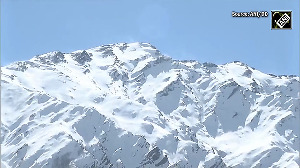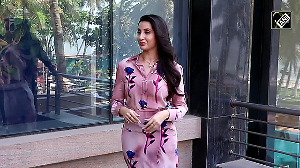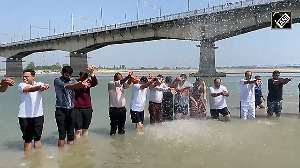Reverting to its old stand, Pakistan on Friday said it had not given up its claim on Jammu and Kashmir and disagreed with India's contention that the state was its integral part.
Interacting with media in New Delhi, High Commissioner Shahid Malik said there was no change in Pakistan's stand on Kashmir as was 'erroneously' reported by the media when President Pervez Musharraf suggested a four-pronged strategy to resolve the issue.
"The media reported Pakistan had given up its claim on Kashmir. We completely disagree with India's position that Kashmir is an integral part of it," he said, referring to Musharraf's interview a few months back wherein he had said Islamabad will give up its claim on Kashmir if New Delhi too did the same.
Pakistan, Malik said, had always argued for an 'acceptable negotiated settlement' of the Kashmir issue. He, however, said that the two neighbours did not intend to remain adversaries forever and the recent peace initiatives and confidence-building measures had done a great deal to improve their relations.
"There is reason to be optimistic that these measures will bring peace to the region," said Malik, who assumed his post in December.
On Siachen, Malik said Pakistan had given some suggestions on ending the military stand-off on the glacier to India and 'certain technical issues had to be resolved.' Islamabad is awaiting New Delhi's response to its suggestions.
Denying that there were any terror camps in Pakistan-occupied Kashmir, he said this was borne out by 'facts.' After the 2005 earthquake in the Kashmir region, numerous non-profit organisations and international agencies were engaged in relief operations there but 'not a single person or agency complained of any terror infrastructure or camp in the region,' Malik claimed.
Reiterating his country's commitment to the global war against terror, he said Pakistan itself was a target of terrorist attacks and had been 'unfairly targeted by the media that we are encouraging or harbouring terrorism in our land.'
Pakistan, he said, was committed to its stand that it will not allow its territory to be used for any terrorist activities.
The envoy expressed the hope that the anti-terror mechanism set up by India and Pakistan will bring positive results.
"This time, both sides will sit at the table, examine the evidence and talk like civilised men, rather than going to the media and fighting through that," he said.
Malik also said the two countries are actively considering liberal visa regimes. Refusing to divulge details, he said, "Whatever the new regime will be, it will be more liberal than what we have now."
He claimed Pakistan was always against a regional arms race.
"When India exploded a nuclear bomb in 1998, it created a security imbalance in the region and Pakistan was compelled to respond with a similar capability. Had we not done that, it was creating a dangerous ambiguity and hazard of miscalculation," Malik said.






 © 2025
© 2025